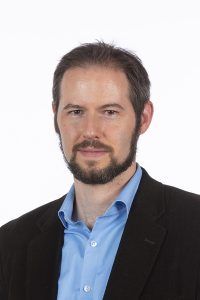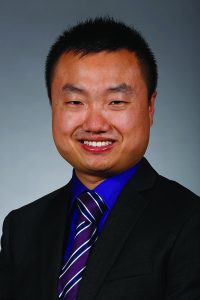Two Cyclone Engineers receive 2021 NSF CAREER awards
Author: Breehan Gerleman
Author: Breehan Gerleman
Nigel Reuel, assistant professor of chemical and biological engineering, and Zhaoyu Wang, assistant professor of electrical and computer engineering, have been selected for 2021 National Science Foundation’s Faculty Early Career Development Program (CAREER).
CAREER awards are the NSF’s most prestigious awards given to early-career faculty. The program aims to build a firm foundation for leadership in integrating research and education.
“Nigel and Zhaoyu’s CAREER projects are exciting examples of how Cyclone Engineers are combining machine learning with innovative areas of research to speed up solutions to pressing challenges,” said Arun Somani, associate dean for research, Anson Marston Distinguished Professor of Engineering and Philip and Virginia Sproul Professor in Electrical and Computer Engineering. “Both Nigel and Zhaoyu are also leaders in engineering education – and their projects will help train and inspire the next generation of creative engineers.”
Nigel Reuel: Better biomanufacturing for better treatments
 Problem: Therapeutic cells show promise as a new treatment option for chronic illness, but advances must be made in manufacturing reproducibility to get therapeutic cells out of clinical trials and into widespread use.
Problem: Therapeutic cells show promise as a new treatment option for chronic illness, but advances must be made in manufacturing reproducibility to get therapeutic cells out of clinical trials and into widespread use.
Project: Reuel will develop novel, real-time sensors and reinforcement learned (RL), dynamic control policies to improve reproducibility in large-scale manufacturing of differentiated, cell therapies.
The research team will build the reinforcement learning agent and test it using simulations with the latest RL algorithms. In parallel, the team will develop real training environments for differentiated cell culture with multiple sensors and control elements. The training environments will then be used to train the RL agent.
Reuel will benchmark this new, dynamic control approach against static differentiation “recipes” using a range of model cells with Iowa State and external collaborators.
Potential Impact: Reuel’s work will make possible practical manufacture of regenerative medicines to treat many diseases such as cancers, autoimmune disease, infectious disease, repairing tissue damage, and neurological disorders. The new modular framework will be easily tailored to different types of sensors, stimulation cues and cell targets, setting it up to take on emerging biomanufacturing challenges.
“Cell therapies are the next wave of therapeutic innovation, demonstrating incredible outcomes and ability to tailor specifically to each patient. In order to realize their full impact, they need to be made more efficiently and safely. Our work will be a part of this effort.”
Possibilities: Part of the project includes new course modules, a tool development workshop and even an interactive art exhibit to educate students and the public about machine learning.
“Both graduate students and undergrads will get training and experience in tool design, cell culture and reinforcement learning, further strengthening the nation’s biomanufacturing capabilities,” said Reuel.
Zhaoyu Wang: Tapping smart meters’ potential for grid resilience
 Problem: Enhanced electric grid monitoring is needed to promote renewable integration while ensuring reliability, but current approaches rely on expensive sensors. Smart meters that electric utilities are already using for billing have potential, but without new computing innovations, smart meters only can provide limited insights into grid performance.
Problem: Enhanced electric grid monitoring is needed to promote renewable integration while ensuring reliability, but current approaches rely on expensive sensors. Smart meters that electric utilities are already using for billing have potential, but without new computing innovations, smart meters only can provide limited insights into grid performance.
Project: Wang will unlock the potential of smart meters with new optimization and probabilistic graph learning methods to enable data-driven, real-time electric network monitoring.
Wang’s team has three goals. They will create new grid topology and parameter identification algorithms that will leverage available but low-resolution smart meter data, discover data connections, and make possible real-time power distribution grid modeling.
The team will also use new graph learning approaches that connect smart meters and other information sources to make fast and accurate outage detection possible. And, third, Wang’s team will design robust data-recovery techniques to take on challenges in smart meter data asynchrony.
Potential Impact: Wang’s innovations will add up to real-time modeling and fast detection of large-scale outages, using smart meters that are already widely in use.
“By harnessing the data collected by existing smart meters, millions of dollars in potential sensor investments are saved. Our work will bring U.S. utilities much needed data-driven grid monitoring that helps minimize outages. Plus, our advances help promote the seamless integration of renewable energy into grids,” said Wang.
Possibilities: Broader impacts of Wang’s project include integrating power engineering education with data science. He’ll make available open-source data sets, create training for energy professionals and develop interactive smart grid educational activities for high schoolers.